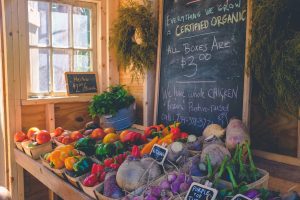Many of you reading this article buy organic certified products and herbal supplements because you feel they are safer. You may think they contain more quality nutrients with less contamination. The reality is that this is not always true. Find out why organic certified products may not live up to the standards you have in your mind and values.
I am going to tell you about my experience importing organic certified Moringa leaves from India a few years back. The reality nearly shut down our business in San Diego because of my inexperience, fraudulent organic certificates, and contaminated herbal product.

In 2015 we were living in San Diego. I discovered Moringa Oleifera and its benefits. It is a tree with leaves that are extremely nutritious. I bought seeds and all of them grew quickly. I had baby trees everywhere. I fell in love with growing them and decided to start a business with my husband selling them. We named our business, Moringa, and Healing Herbs. We spent the time and money to get a nursery license and began selling the trees. It was a beautiful area to grow them. Then we decided we should sell the packaged Moringa powder and tea as well. After investigating several US companies that wholesaled Moringa products, we could not really confirm the quality of the supplements. All were vague about their testing. So, we made the decision to import Moringa products directly from India. That way we could ascertain it was Organic and tested properly. Our goal was noble.

After two months of investigation and correspondence, one company among others stood out among the different companies. The owner of the company sent me pictures of their plantation, samples of their products, and a very realistic certified organic certificate. We sent them $500.00 as a starting order. When the order never arrived, I investigated the company through the Organic Certifying Organization directly in India. Well, in the end, I was told his certificate was stolen from another company and fraudulent. We lost all the money. This guy evaded authorities after bilking several other companies in that same time period and disappeared into the millions who live in that country.
Organic Certificates Can Be Forged
Organic certificates can be forged, so organic certificates have to be investigated by the country itself. This takes a lot of time, effort, and frustration. Many of the plantations are crude with basic simple equipment, workers including children who are not healthy, and a lack of clean water and sanitation facilities. Cleaning and drying the products are often in the open air or in buildings that are less than sterile. The storage areas are open to rodent contamination and product destruction. This is India we are discussing. In Indonesia, China, and the Philippines, the same problem exists.
Investigation of the company doesn’t always work either
So, we cut our losses and next I investigated different companies through the certifying agent in India. I was already emailing the representative concerning the fraudulent company and we had exchanged a number of emails. That agent recommended a company confirming it was a great company with certified organic status and quality products. I investigated this company with extensive due diligence. I was now confident in the quality of the product I was buying. I did not have the money to test it myself here in the US.
Shipment is confiscated by port agents.
So, we sent them $800.00 which was their minimum order. Their customer service was excellent. Four weeks later the shipment entered the US. It was inspected while sitting on the ship and flagged for label issues. We were then informed the product would be tested as well. Next, we were sent a notice that the product had been found to contain contamination of dirt, filth, insect, and mouse parts. We would not get the shipment back and it would be destroyed by them. I was devastated at the news. The good news is that the shipment was tested. What if I had sold that product to my customers? That was the end of importing products for us. We could not afford to wonder about the possible contaminated product. We could not with a conscious tell our customers, the product was safe.
We did eventually get the money back from the company, but this experience taught me a number of important lessons.
Importing food and herbs is not for the faint of heart.
Importing is a complicated process that needs some real expertise to keep from losing your money and your business. If you want to import herbs to sell, you better get sage advice first from someone actively working in the business. Importing food and herb products are even more complicated filled with all sorts of surprises from inspectors at the ports and the FDA.
- Organic certification does not mean the product cannot be naturally contaminated with dirt, weeds, insects, rodent hair, and feces. Despite the yearly testing in India, that does not mean the products cannot be contaminated during those months without inspections. Contaminated water, contamination from the people picking the leaves, equipment that was not disinfected properly, drying procedures that were shoddy, or storage in a building that was not safe from insects or rodents. Organic certification does not mean those organic standards and requirements were followed 100 percent of the time. If you know it’s going to be a year before inspection again, it is easy to cut quality control corners.
- Organic quality depends on owners who follow those organic standards every day and take pride in the quality of their organic products. The organic certificate is only as good as the owners who either live up to those standards or cut corners.
- The inspections in those countries in Asia are highly questionable and often fraudulent. How many companies have the time to check out these foreign growing fields? Do they actually visit their plantations to see in reality their farming practices? The second company was legitimate, but its organic-certified products were still not safe for consumption.
- You cannot assure safety unless the products are tested in a US GMP-certified lab. You cannot testify for your customers, the quality of your products unless they are tested for heavy metals, E-coli, bacteria, lead, and other contamination.
I offer another example from San Diego and the farmers’ markets there.
While we lived there, we visited the different Farmer’s Markets on the weekend. I loved to browse through the organic produce. I did wonder how these smaller producers kept up with bringing products to the market, week in and week out. Then an investigation was triggered by complaints that the vendors were substituting store-bought produce when they were short in their ability to supply their own organic offerings. It turned out to be true.
How do you tell organic produce from store-purchased? If you only have one box of your own organic produce and you need much more to sell to make a profit and pay the vendor fees, what do you do? It depends on your commitment to honesty and integrity. How easy is it to buy some retail lettuce, add it to your organic produce, mark up the price, then sell it as organic making a profit? In doing that, you made enough to pay for the vendor fees. Remember, those vendors pay a price to be a part of the Famer’s Market in each location. They have a lot of expenses. They have to make a profit.
Here are two more examples below:
Just about two years ago, a farmer was indicted for selling grain as organic, when it was not. He got away with it for a few years. He did get caught, but how many people ate that food, thinking it was organic? This happens more often than you would think.
When we lived in Nevada, I went to buy chickens from a woman who also sold shares in her organic vegetable crops that she sold from her house. She warned me about another woman who lived in the area who substituted her offerings for store-bought greens when insects came in and destroyed the whole crop. She later got caught and fined. She had been secretly spraying her vegetables with unapproved insecticides at night on the days when her shop was closed.
Organic certificates are only as good as the owner farmers who must adhere to the strict organic guidelines. Their honesty in how they grow their crops is the end criteria to determine if a food is truly organic and free from contamination of one sort or another.
Cultivate friendships with local farmers who live in your area and visit their farms. Talk to them and ask them questions. When you are asking questions, like what are the organic steps that you take in your fields, watch their eyes, listen to their voice, and observe their behavior. When people are lying, they look down, look away from you, and refuse to look you straight in the eyes. Do they avoid giving you answers and explaining the procedures they take? Body language will tell you a lot if you can trust them. You can learn a lot that way.
Be observant and mindful when visiting farmer’s markets.
If nothing else, ask these same questions to the vendor in the farmer’s market. Observe him in the same way. Listen to your gut feeling about the vendor. Ask as an interested consumer, not someone looking to shut him down. Be casual and friendly as you have the discussion. A vendor proud of his organic steps will gladly tell you and show his pride. They want to educate people on buying organic and what it takes to grow organically.
Many growers use organic standards but do not have an organic certification.
You should also realize that some farms use organic standards but don’t have an organic certification because it can take months to get that. The red tape is endless and enough to discourage anyone from the effort. Some farms, lacking that organic certificate may produce and sell better quality products than some farms with the certificate. Again, ask questions and watch body language. Remember it is the honesty of the farmers and their growing practices, that make your food healthy and worth buying.
Overall the majority of organic growers are honest, dedicated growers.
There are many thousands of organic farmers, who produce quality vegetables, fruit, and herbs. They follow the Organic guidelines with pride. When organic crops are grown properly, they are healthier and contain more vitamins, nutrients, and trace minerals than conventionally raised crops. It is important to buy organic while being mindful of vendors who may not be trustworthy. Shop smart and use discretion when buying organic.
All for today, Cathryn Freer, the herbladyisin

